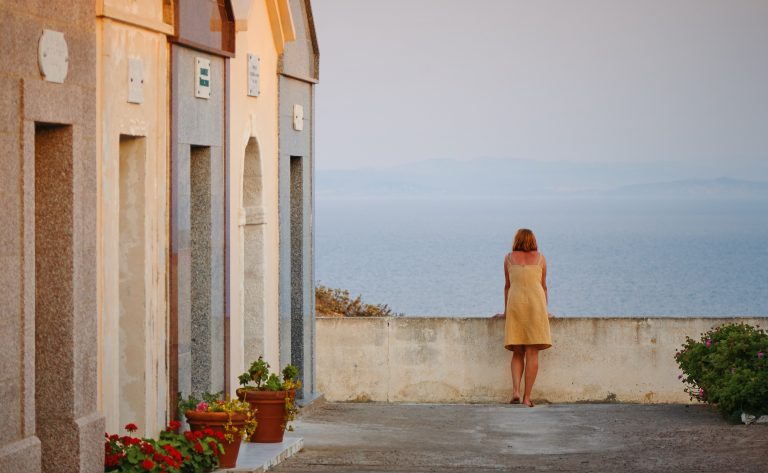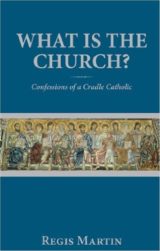By Regis Martin
Regis Martin is the author of over half a dozen books, including What Is the Church?: Confessions of a Cradle Catholic. With his trademark mastery of the English language, Martin leads the reader to contemplate the wonders of God and the Catholic faith.

Prayer must seem such a quaint notion to folks moving briskly along the information superhighway. Armed with headsets and cell phones, have they really got time to punch in God’s number? Have they even got time to be quiet? My sense is that people find silence positively unsettling. Even pious churchgoers tend to get a wee bit nervous when the music stops, after Communion, say, when the rubrics actually allow for a spot of silence, and they commence to fidget, so accustomed have their sensibilities become to that ambient noise in which we all live and move and (dis)locate our being. For others, I suspect, it amounts to an affront against the sacred democratic din that has come to dominate so much of modern life.
That special stillness which surrounds and fills everything beautiful and noble, which pervades especially the sacred, the numinous, is threatened as never before by the noise of words. “If someone were to ask me what the liturgical life begins with,” writes Guardini, “I should answer: with learning stillness. Without it, everything remains superficial, vain.”
In his book The World of Silence, a deeply wise work that anyone who traffics in words ought to be made to read, Max Picard has written: “Silence provides a natural source of re-creation for language, a source of refreshment and purification from the wickedness to which language itself has given rise. In silence language holds its breath and fills its lungs with pure and original air.”
Imagine if politicians, hot on the campaign trail, were to institute such a practice. In fact, says Picard, whenever two people come together to speak, there is always a third who listens. His name is Silence. It is as if, Picard tells us, “everything said here aloud in words has already happened in silence, for that is what gives the words their quality of sure certainty, intimacy, and sublimity.”
A little Picard goes a long way, I have found. It puts me in mind of Pascal’s wry prediction, set down in the Pensées, that most of the crime committed in the world is the unhappy outcome of people unable to spend five minutes alone in their rooms. Hell, in other words, is not other people (Sartre was dead wrong there). Hell is being alone, and not just for five minutes, but forever.
So when the Psalmist says, “Today if you hear the voice of the Lord, harden not your hearts,” what are we to make of it? In a world swept free of stillness, where the only voice we hear is our own, a mindless twittering amid the larger dissonance of radio and TV, how does one manage to keep His voice from becoming unheard and unheeded?
Often in trying to get a fix on the importance of putting prayer first, even in the classroom, I like to recall an observation I came across years ago, that it was God Himself Who instituted prayer in order to confer upon His creatures the dignity of becoming causes—an imperishable insight, it seems to me, and one especially worth passing along to impatient youth, for whom so often questions of empowerment get reduced to the political—that is, Who gets to do what to whom?—a question no more stultifying than which can scarcely be imagined. Meanwhile, how exquisitely simple is the truth before us: that by our prayers we literally cause things to happen, like, for instance, the success of one’s study, or of this book.
And isn’t that, after all, the sense we are to assign the Lord’s Prayer, the most celebrated petition ever lifted up before God? How instructive that Christ Himself, when asked by His apostles to pass on His practice of prayer, should enjoin them to ask the Father in heaven for this and that? Why not, then, I tell my students, importune God to help you learn to plumb the depths of the mystery of His Bride, the Church? Will God be disposed to help any of us if we don’t take the time to ask? As Saint Alphonsus Liguori tells us in an extraordinary passage, approvingly set down in the Catechism: “Those who pray are certainly saved; those who do not pray are certainly damned.” Another icebreaker.
You Might Also Like

In his 1998 encyclical Tertio Millennio Adveniente, Pope John Paul II asked catechists and theologians “to promote a deeper understanding of the ecclesiological doctrine of the Second Vatican Council as contained primarily in the Dogmatic Constitution Lumen Gentium” (no. 47). To respond to this call, Dr. Regis Martin wrote What Is the Church? in order to present a faithful ecclesiology in simple, accessible terms.

